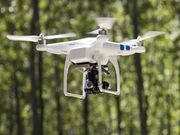Finding means they could be used to supply accident sites, natural disasters, rural areas
MONDAY, Dec. 12, 2016 (HealthDay News) — Blood products don’t seem to suffer damage when transported by drones, according to a study published online Nov. 11 in Transfusion.
Timothy Amukele, M.D., Ph.D. an assistant professor of pathology at the Johns Hopkins School of Medicine in Baltimore, and colleagues placed large bags of blood products into a cooler loaded on a drone that was flown 8 to 12 miles at about 328 feet off the ground. Flight time was just over 26 minutes. There were different test flights for three types of blood products: red blood cells, platelets, and plasma units. Wet ice, pre-calibrated thermal packs, and dry ice were used to keep each type of blood product cool, respectively.
Tests showed that the blood products maintained proper temperature and cellular integrity during transport on the drone, the researchers said. The study authors plan more and larger studies in the United States and other countries, and want to test methods of active cooling, such as programming a cooler to maintain a specific temperature.
“My vision is that, in the future, when a first responder arrives to the scene of an accident, he or she can test the victim’s blood type right on the spot and send for a drone to bring the correct blood product,” Timothy Amukele said in a Hopkins news release.
Full Text (subscription or payment may be required)
Copyright © 2016 HealthDay. All rights reserved.








